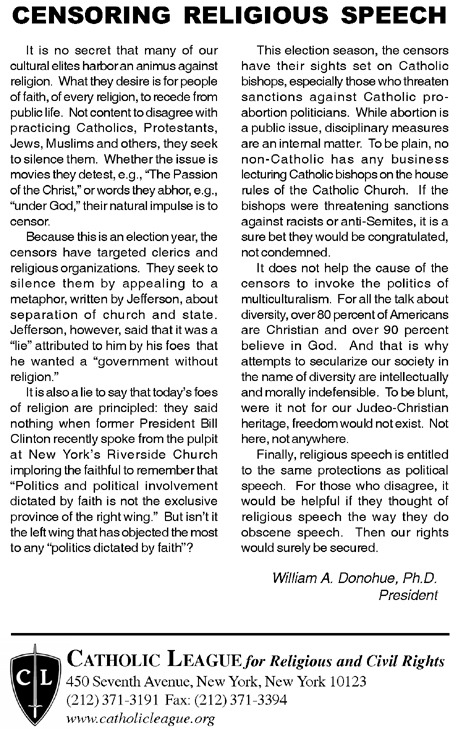ARE PRIESTS EQUAL BEFORE THE LAW?
It is easy to argue that those who have been sexually abused deserve to see their victimizers pay for what they did. It is equally easy to argue that those who have been accused of such crimes be allowed the right to defend themselves. What is not so easy is convincing an accused priest that his rights are identical to yours and mine.
It cannot be maintained with any seriousness that priests are being given a fair shake in the courts these days. This is especially true of the dead. And it is as true in the legal courts as it is in the court of public opinion.
That there have been miscreant priests and delinquent bishops has been well established. For decades, bishops and religious superiors turned their clerical eyes away from the promiscuous homosexuals in their ranks, pretending that what the public does not know won’t harm them. They really thought they could put a lid on their dirty laundry.
With this as a backdrop, it is only logical that those who have been abused are understandably angry. But it is important to remember that even in this highly tense environment, claiming victim status is not proof of victimization. Otherwise, we might as well do away with the courts—simple declarations of victimhood and charges of criminal behavior would be sufficient. This is not what our system of justice allows: a trial by our peers in a court of law following accusations of guilt is our standard. It is also our standard that such accusations be made within a reasonable period of time following the alleged offense.
It is this last point—the point about a statute of limitations—that is a source of much concern in priestly circles these days. Ever since the scandal broke, a tidal wave of accusations have been made, some of which are true, others of which may be true but can no longer be fairly adjudicated, and others of which are patently false. It is these last two that are the problem.
The reason why we have a provision in law for a statute of limitations is because memories fade and witnesses die, making it difficult to determine innocence or guilt. In a system which affords rights to the accused—we are assumed innocent until proven guilty—the scales of justice necessarily tilt towards the accused. But priests may be forgiven if they think this is a fairy tale. Consider the following examples.
In Los Angeles, the archdiocese is having to defend itself against allegations up to 70 years old. In Philadelphia, the district attorney has been in hot pursuit of priests for the past few years, and she has finally gotten her mitts on one—a priest who allegedly abused a teenage boy in 1978. An alleged victim from Wisconsin is just now coming forward saying he was abused in 1988. The Diocese of Tucson, Arizona, has filed for bankruptcy because of all the money it has had to dole out, and is now seeking to avoid paying punitive damages for a case that supposedly occurred in the 1960s.
Louisville, Kentucky, is the scene of a train of alleged victims coming out of the woodwork claiming they were abused by a priest and five nuns going back to the 1950s. All six of the accused are dead.
When the alleged victims can’t win because of the statute of limitations, they pressure state legislators to make some revisions in the law. Or they pursue civil suits. Many simply indict elderly priests, as well as the deceased, in the court of public opinion, counting on professional victims’ groups to rally to their side. They are never disappointed.
Imagine, for a moment, that one of your siblings was a priest who passed away a few years ago and is now having his name dragged through the mud by an accuser he cannot face, and who may, in fact, be lying through his teeth. This is what some Catholics have had to face. This isn’t justice—it’s injustice wrapped in the mantle of justice. And the fact that it is only happening to a select segment of the population makes it all the more outrageous.
Add to this the reality of some greedy and mean-spirited lawyers who make a killing by ripping off the Catholic Church, and the result is a script ripe for Hollywood. But don’t count on the boys from Tinseltown having any interest. They’ve already made up their minds who the bad guys are, and they’re not about to let the facts get in their way.
Finally, don’t expect the ACLU—ever the civil liberties watchdog—to enter the fray on behalf of priests. They’re too busy defending Islamic terrorists. Besides, ACLU attorneys mostly do pro bono work, and who among them is going to have the guts to tell his law partners that he’s now representing the Catholic Church?

